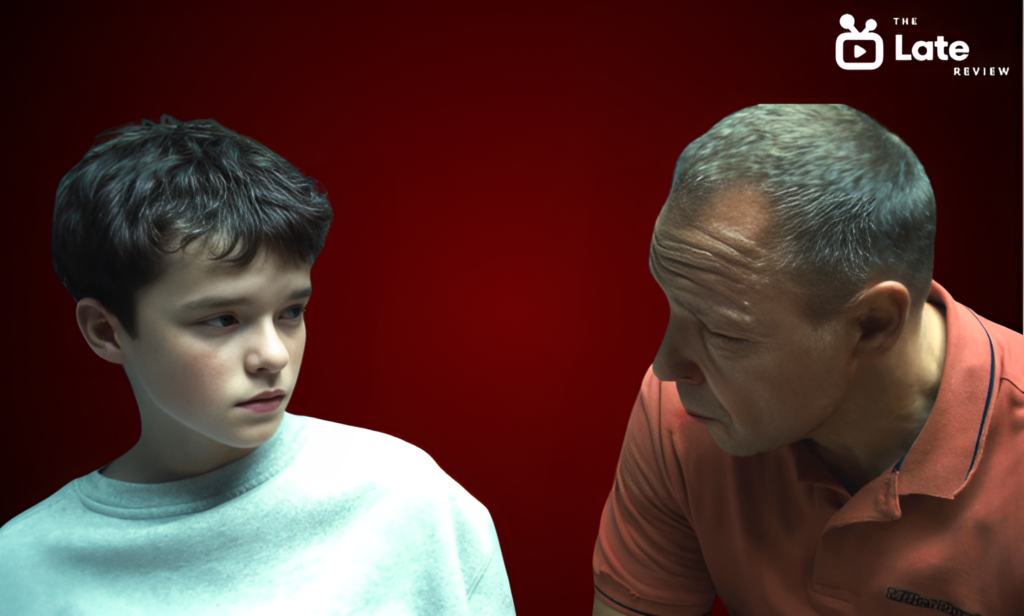

Adolescence (2025) is a haunting psychological drama that blends raw realism with emotionally charged storytelling. Directed by Sean Buckley, the series delivers a gripping and unfiltered look into the dark side of teenage life in the digital age. With powerful performances — especially from Stephen Graham and newcomer Rudy Law — and a bold one-take filming style, the show creates an immersive, heart-wrenching experience that lingers long after the final scene.
Adolescence doesn’t ease you into its world — it jolts you into it. The very first scene shows 13-year-old Jamie Miller being dragged out of bed by armed police, his terrified parents unable to speak. He’s accused of murdering his classmate, Katie Leonard, and from that horrifying moment, the show forces you to confront something deeper than crime — a shared failure. It’s a story about a boy who didn’t scream for attention but quietly faded into the shadows, until it was too late. And in those first minutes, you’re already grieving a child you never knew.
What makes Adolescence so brutally immersive is its one-take format — no cuts, no timeouts, no escape. Each episode unspools in real time, locking you into the emotional wreckage of a family’s unraveling. You don’t just witness the panic, sorrow, or confusion — you’re stuck in the room with it, as if the camera is refusing to let you look away. This bold technique doesn’t just add realism, it deepens your connection to the pain, creating a suffocating intimacy that’s rare in modern television.
Jamie Miller is not the monster the headlines might make him out to be. He’s a soft-spoken, lonely boy who slipped under everyone’s radar — parents, teachers, friends. Slowly and silently, he is pulled into the dark underbelly of the internet, where harmful ideologies and hate wear the mask of belonging. The show painfully captures how isolation, neglect, and the hunger to be seen can lead even the most innocent child into a dangerous place, and it leaves you asking: how many Jamies are we not seeing?
Stephen Graham gives a performance that doesn’t feel acted — it feels lived. As Eddie Miller, the devastated father, he carries the unbearable weight of not knowing where things went wrong. His grief is not loud, but crushing — a slow crumble of a man trying to reconcile the son he knew with the boy the world now fears. Every look, every word trembles with guilt and helplessness, and as a viewer, you don’t just watch him mourn — you mourn with him.
Beneath its surface of true-crime storytelling, Adolescence is a deep, scathing critique of how society is failing its children. It reveals how easy it is for a teenager to find comfort in chaos online, and how invisible their struggles can become in a world distracted by screens and silence. It’s a powerful reminder that without connection, conversation, and care, the internet will raise our children — and it doesn’t always raise them kindly.
Adolescence has ignited national conversations, with critics applauding its bravery and educators pushing for it to be shown in schools. Even Prime Minister Keir Starmer praised the series for shedding light on mental health, youth vulnerability, and online dangers. But for all the attention it has received, the message behind the show remains chillingly urgent — because what happened to Jamie could be happening to any child, right now, without us even knowing. And the show’s greatest tragedy is that its warning comes after the fact.
Once the final scene fades, Adolescence doesn’t leave you — it lingers like a shadow. Jamie’s blank stare haunts your thoughts, Eddie’s trembling voice echoes in your ears, and the silence of a broken home wraps around you like a chill. Suddenly, the quiet children around you feel more visible — the ones who seem fine, but aren’t. You begin to question whether we’re truly listening to our kids, or just hoping they’re okay. This isn’t just a show — it’s a mirror reflecting truths we often try to ignore.
Adolescence (2025) is more than a series — it’s an emotional reckoning. It forces you to sit with uncomfortable truths about parenting, technology, and the fragile state of our youth. With unforgettable performances and a daring cinematic approach, it shakes you in the best and worst ways. This isn’t just recommended viewing — it’s necessary. Watch it to understand, to feel, to question. Because the next Jamie is already out there. And this time, we need to hear him before the silence comes again.
Rating: ⭐⭐⭐⭐☆ (4/5)
Veera Dheera Sooran is a gripping action thriller that masterfully blends commercial appeal with a raw and realistic narrative. Directed…
A Comedy-Driven Ride with Familiar Elements Dragon (2025) is a Tamil comedy-drama directed by Ashwath Marimuthu, known for his work…
Overview Kaadhal Enbadhu Podhu Udamai (translated as Love belongs to everyone.) is a Tamil drama that delves into the complexities…
Over 30 years after its release, The Crow (1994) continues to captivate audiences with its timeless blend of gothic style,…
Overview Directed by Adam J. Graves, the film follows Anuja, a gifted young girl working in a Delhi garment factory…
Overview Ajith Kumar’s much-anticipated "Vidaamuyarchi" has finally hit the screens, and it’s a breath of fresh air! Directed by Magizh…
This website uses cookies.